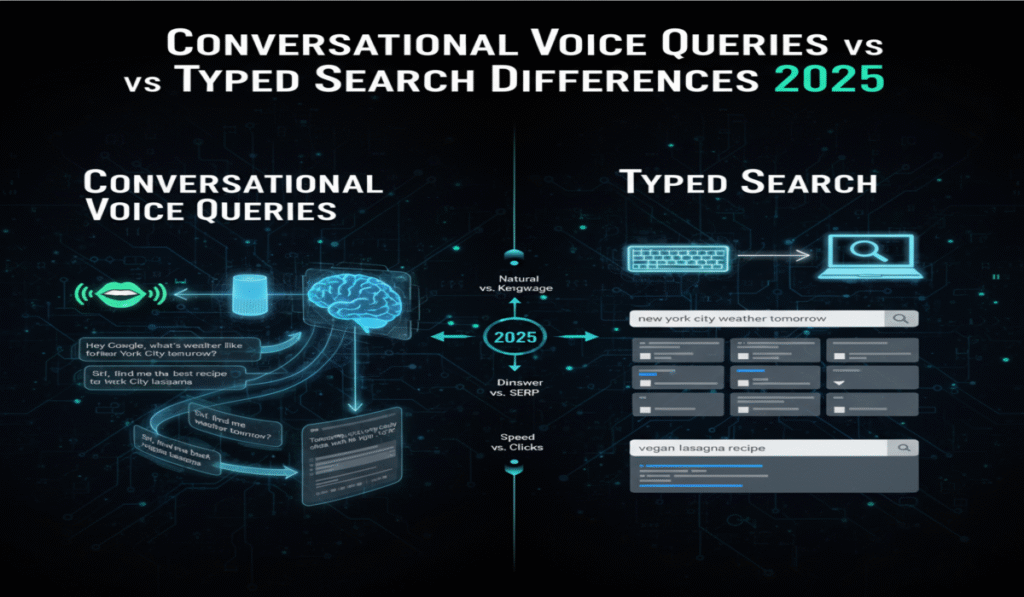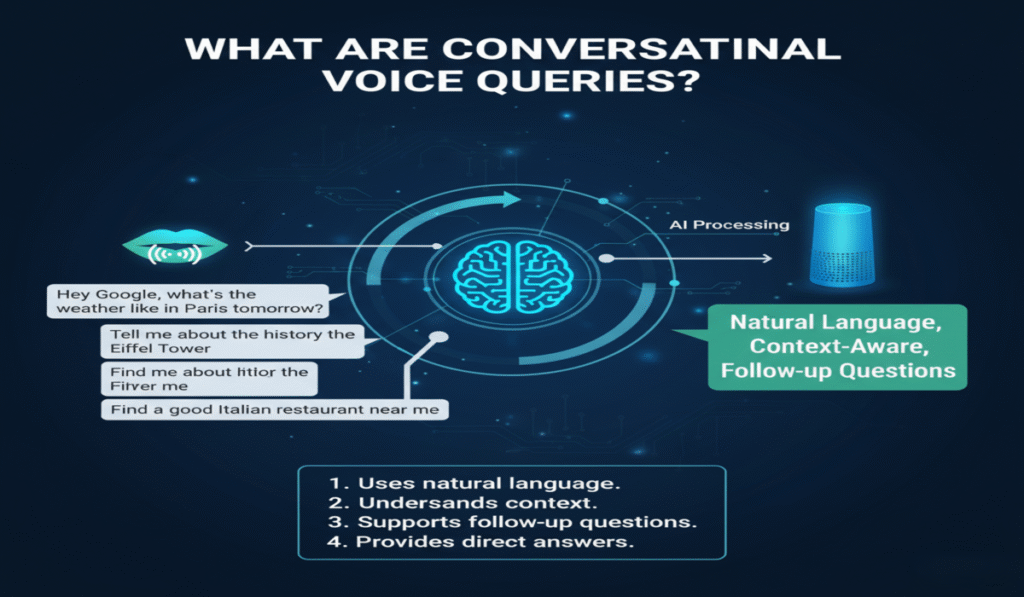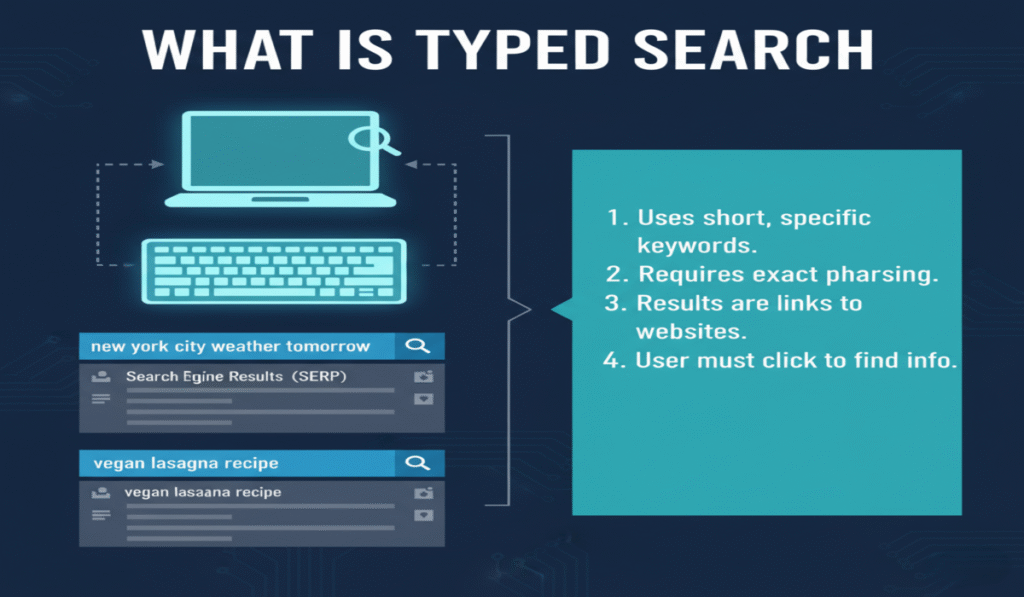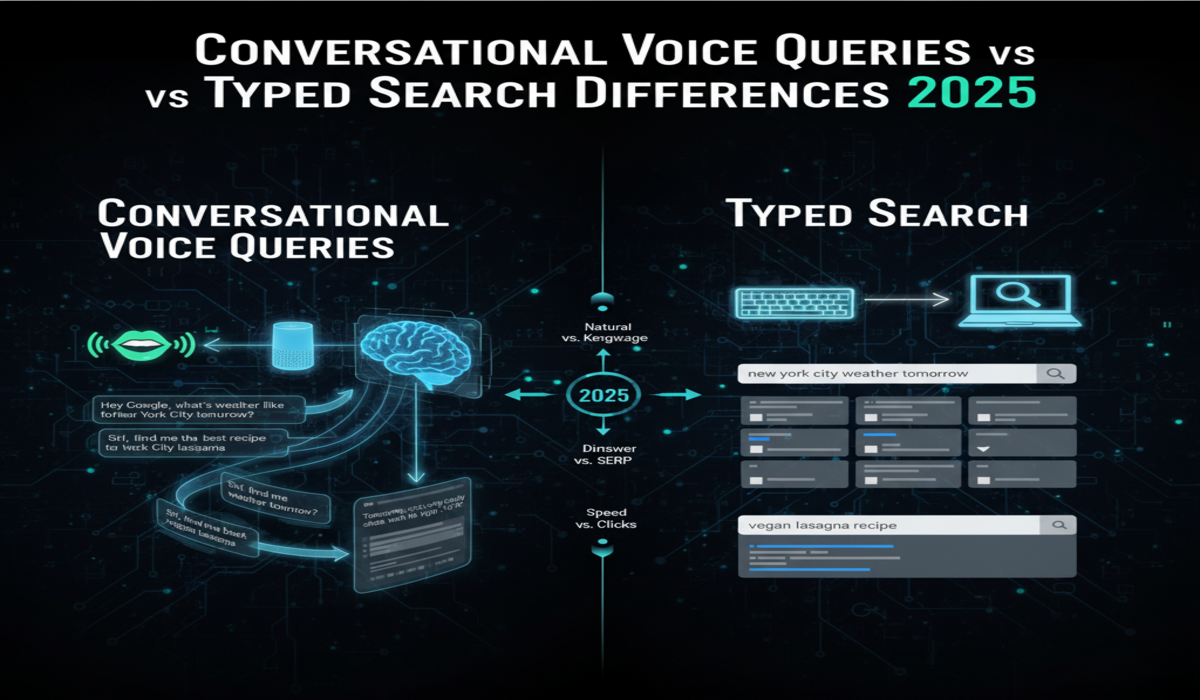Discover the key differences between conversational voice queries vs typed search in 2025. Learn how they impact SEO, user behavior, and marketing strategies with practical insights.
Table of Contents
Introduction – Conversational Voice Queries vs Typed Search
Search behavior is changing faster than ever. Just some years inside the beyond, maximum human beings typed brief key phrases into Google like “incredible smartphones 2020”. But in 2025, the way users seek has converted. With smart speakers, cell assistants, and AI-driven systems, conversational voice queries vs typed search differences 2025 have end up one of the most updated topics in virtual advertising and marketing and advertising.

Understanding those variations is important for organizations, bloggers, and entrepreneurs. Optimizing for typed searches on my own isn’t enough anymore—voice queries are shaping the destiny of searching for, and they require a special method.
In this blog, we’re capable of find out the variations among conversational voice queries vs typed search differences 2025, their effect on seek engine advertising, and the way you could adapt your content method.
What Are Conversational Voice Queries?

Conversational voice queries are natural, spoken questions or commands that people give to voice assistants like Siri, Alexa, or Google Assistant.
For example:
- “Hey Google, what’s the best coffee shop near me that’s open right now?”
- “Alexa, what’s the weather forecast for tomorrow evening?”
These queries are longer, more conversational, and often framed as complete questions.
What Is Typed Search?

Typed search refers to the traditional way of looking for information online—typing keywords into a search engine.
For example:
- “coffee shop near me”
- “tomorrow weather forecast”
These searches are usually shorter and more keyword-focused because users want speed and efficiency.
Conversational Voice Queries vs Typed Search Differences 2025
The hole amongst voice and typed searches is wider in 2025 than ever before. Let’s observe the essential factor regions of distinction.
1. Query Length and Style
- Voice Queries: Longer and conversational, regularly 6–10 terms. Example: “What are the healthiest dinner alternatives for youngsters in 2025?”
- Typed Search: Short and direct, typically 2–4 words. Example: “healthy dinner youngsters 2025”.
2. User Intent
- Voice Queries: Reflect herbal human idea and frequently display higher reason. Example: “Where can I buy green shoes close to Lucknow?”
- Typed Search: Focuses on large exploration. Example: “eco footwear Lucknow”.
3. Device Usage
- Voice Queries: Used extra on smartphones, clever audio device, and wearables.
- Typed Search: Dominant on computers, laptops, and cellular typing.
4. Search Context
- Voice Queries: Often region-based totally completely or immediately. Example: “eating locations open right now close to me.”
- Typed Search: Less depending on actual-time needs. Example: “eating places Lucknow.”
5. SEO Optimization Needs
- Voice Queries: Require lengthy-tail key phrases, natural language, and FAQ-style content cloth.
- Typed Search: Focuses greater on brief key terms, based content, and meta tags.
Why Are Voice Queries Growing in 2025?
Voice era has become part of each day life. Here are the motives why voice searches are booming in 2025:
- Smart Speakers Everywhere – Homes are filled with Alexa, Google Nest, and Apple HomePod.
- Hands-Free Convenience – People use voice at the same time as driving, cooking, or multitasking.
- Improved Accuracy – AI-powered voice assistants now apprehend context, accents, and languages better than ever.
- Faster Results – Speaking is faster than typing for plenty users.
- Integration with IoT – From clever automobiles to wearable devices, voice is everywhere.
Typed Search Still Matters in 2025
Even even though voice is growing, typed search hasn’t disappeared. It nevertheless performs a key position in:
- Detailed studies (e.G., academic subjects, lengthy-form content).
- Workplace utilization (e.G., searching from desktops).
- Visual searches (when customers need pics, movies, infographics).
So, within the battle of conversational voice queries vs typed search differences 2025, it’s no longer about changing one—it’s about the usage of each strategically.
Impact on SEO in 2025
Voice SEO Strategies
- Use long-tail keywords that match natural speech.
- Create FAQ pages to answer conversational queries.
- Focus on local SEO—voice searches often include “near me.”
- Optimize for featured snippets and zero-click answers.
- Improve website speed and mobile optimization.
Typed Search SEO Strategies
- Continue using keyword-rich titles and meta descriptions.
- Optimize content for structured data and SERP features.
- Focus on backlinks and domain authority.
- Create detailed blog posts and guides.
- Use concise keywords for search visibility.
Conversational Voice Queries vs Typed Search Differences 2025 in Real Life
- Example 1:
- Voice: “What’s the best budget smartphone under 20,000 rupees in India this year?”
- Typed: “best budget smartphone India 2025 under 20000”
- Example 2:
- Voice: “Which restaurants near me are serving vegan food tonight?”
- Typed: “vegan restaurants near me”
- Example 3:
- Voice: “What are the differences between voice and typed search in 2025?”
- Typed: “voice vs typed search 2025”
This shows how conversational voice queries are longer and closer to natural dialogue, while typed searches are short and keyword-heavy.
Future Predictions: What’s Next Beyond 2025?
- Voice Search Will Dominate Local SEO – More businesses will optimize for “near me” searches.
- AI Assistants Will Become Smarter – Context-aware, predictive answers will become the norm.
- Hybrid Searches Will Rise – Users may combine typed and spoken searches in a single session.
- Visual + Voice Search Integration – Platforms like Google Lens will merge with voice queries.
- Personalized Search Experiences – Voice searches will adapt to user habits and preferences.
Key Takeaways
- Conversational voice queries vs typed search differences 2025 spotlight the growing importance of herbal language and person motive.
- Voice is better for quick, nearby, and conversational searches.
- Typed seek is still powerful for studies-heavy, key-word-targeted desires.
- Smart search engine optimization strategies require balancing both voice and typed optimizations.
Conclusion
The comparison of conversational voice queries vs typed search differences 2025 in reality shows that the way humans seek online has advanced. Voice queries have become longer, extra herbal, and context-driven, even as typed searches remain short and keyword-focused.
For marketers, the key’s stability. Voice search optimization needs herbal language, long-tail keywords, and nearby SEO, at the same time as typed search requires traditional keyword techniques and dependent content material. Businesses that adapt to each will live in advance of the opposition in 2025 and past.
In easy phrases, typed seek isn’t going away, but voice seek is growing rapidly. The destiny belongs to people who prepare for conversational voice queries vs typed seek variations 2025 by using combining both techniques for maximum visibility, engagement, and conversions.
FAQs about Conversational Voice Queries vs Typed Search Differences 2025
Q1. What is the main difference between conversational voice queries and typed search in 2025?
Voice queries are longer, conversational, and intent-driven, while typed searches are shorter and keyword-based.
Q2. Why are voice queries more popular now?
Because they are faster, hands-free, and integrated into smart devices like speakers and smartphones.
Q3. Do I still need to optimize for typed search?
Yes. Typed searches remain important for research, workplace, and detailed queries.
Q4. How can I optimize for both voice and typed searches?
Use a mix of short and long-tail keywords, FAQ-style content, and structured SEO strategies.
Q5. Will voice completely replace typed search in the future?
Not entirely. Voice will dominate for local and quick queries, but typed search will remain valuable for in-depth research.


3 thoughts on “Conversational Voice Queries vs Typed Search Differences 2025”